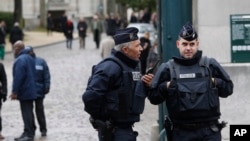Last week's terrorist attack against a French satirical publication that left 12 dead in Paris came despite years of efforts by the United States and its allies to degrade Islamic extremist groups.
Analysts are warning the attacks on Charlie Hebdo magazine in Paris and a foiled plot in Washington point to a tactical shift in terrorist attacks. Rather than receiving direct commands from a particular extremist Islamist organization, attackers are increasingly creating their own networks to plan and carry out strikes.
Vice president of tactical analysis for global intelligence firm Stratfor, Scott Stewart, told VOA attackers are responding to calls from militant groups to conduct individual jihad and then operating on their own.
"The idea is to shift it so that you can not just monitor one organization and their communications and then track down all the operatives," said Stewart. "The idea is to make it this kind of diffuse, amorphous network that can then conduct the attack without having direct links that the intelligence agencies can focus on."
Al-Qaida in Yemen has claimed responsibility for the Paris killings, saying it was directed by one of its senior operatives, Anwar al-Awlaki, and carried out by brothers Said and Cherif Kouachi.
But while U.S. and Yemeni officials believe Said Kouachi may have trained in Yemen, analysts are skeptical the brothers received anything more than inspiration and target information from the organization.
Al-Awlaki was killed in a U.S. drone attack in Yemen in September 2011. The al-Qaida operative had identified the French publication Charlie Hebdo and its editor Stephane Charbonnier as targets.
The FBI says an Ohio man arrested Wednesday for planning a deadly bomb-and-gun attack on the U.S. Capitol was inspired by the Islamic State (IS) and Anwar al-Awlaki.
A criminal complaint notes suspect Christopher Cornell did not think he would receive specific authorization from his contacts overseas to conduct a terrorist attack in the United States, but he stated he wanted to go forward with violent jihad anyway. The FBI had been tracking Cornell for at least six months.
Thed director of the Center on National Security at Fordham Law School in New York, Karen Greenberg, says trying to track down these kinds of individually-organized terrorists is difficult and may demand a counter-terrorism approach beyond drone strikes.
"If what AQAP [al-Qaida in the Arabian Peninsula] and/or ISIS have become are monikers of people who self-radicalize, then I am not so sure that cutting off the head, which used to be the way you would say 'Cut off the head of the organization and you kill the organization, is going to help in any way, because this is the narrative that is driving this, more than an individual or a hierarchical structure," said Greenberg.
While leaderless individual operatives are harder to track, Stewart says, they are also less professional and therefore less able to pull off a major terrorist attack.
French intelligence had been tracking the Kouachi brothers and a third attacker, Amedy Coulibaly, for several years before they launched the Paris attacks. Greenberg says the problem is not a lack of intelligence . Instead, she says, there needs to be better analysis and improved ways of countering potential threats.





